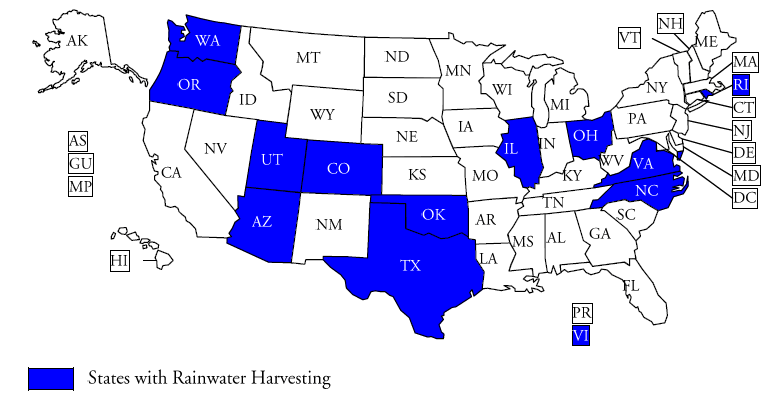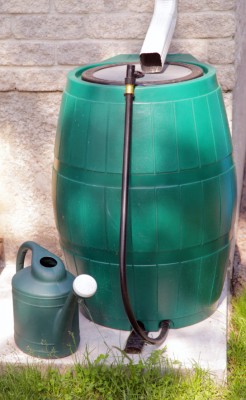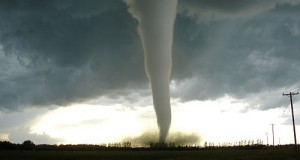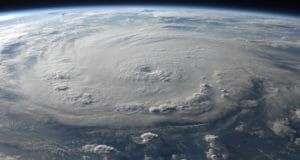Collecting rainwater in barrels is a common Earth-friendly and off-grid living practice, but the sustainable existence chore is illegal in many states. Unless you own the water rights on the property, it is not permissible to salvage rainwater in barrels for future use. Western states where water is in high demand, like Colorado, Utah, and Washington, have laws which prohibit rainwater collection or diversion.
It may sound like common sense that a deed to a piece of property includes the rights to the water below, but that is not always the case. As a real estate agent with an appraiser husband, I know all too well the look of shock on a homeowner’s face when such a pesky little detail is revealed during the selling process.
Until learning about the latest infringement on property rights, I had never considered that the water rights clause pertained to anything above ground, with the exception of streams and rivers. The legal definition of water rights does include the phrase, “gathers on the surface of the Earth.” Apparently states which do not allow homeowners the right to fill rainwater barrels take the surface gathering aspect to the extreme. Typical surface water litigation cases involve damaging adjacent properties or altering a naturally flowing body of water – not catching raindrops falling from heaven for off-grid or sustainable purposes.
Salt Lake City Toyota dealership owner Mark Miller found out about the Utah law the hard way. He constructed a large rainwater collection system to use for washing cars on his lot. Instead of heralding the Earth-friendly business decision in one of the driest states in America, Miller was faced with a violation letter.
Miller had this to say about his brush with the law:
“Utah’s the second driest state in the nation. Our laws probably ought to catch up with that.”
Mark Miller’s story had a relatively happy ending. Salt Lake City officials ultimately entered into a compromise with Miller in the unlawful diversion of rainwater case – after several months of negotiations. The Utah town agreed to let the car dealership use “their water” to wash cars. When a city official was asked if a citizen using rainwater to take care of houseplants was also committing a crime, he answered “yes.” While the lawmakers stated the city has “bigger fish to fry,” it would still be within the power of the government to cite your grandma for using rainwater to care for her prized rose bushes.
Ultra Efficient Water Filter Fits In Your Pocket!
An Eagle Point, Oregon man spent 30 days in jail because he dug three reservoirs on his property in order to collect rainwater. Gary Harrington collected about 13 million gallons of water before being ordered to drain the ponds. Harrington stated during interviews with local media outlets that he was collecting the rainwater for personal use and fire suppression.
Gary’s concerns about having readily available water for fire suppression is a very valid claim. When you live in a rural area, fire hydrants do not exactly dot the landscape. Firefighters routinely draw from ponds, reservoirs, swimming pools, and lakes to fight brush and structures blazes. Fire engines are extremely expensive, therefore rural departments usually have only one or two tanker trucks. Harrington’s rainwater reservoirs could help save his property, adjacent homes, and more importantly, the lives of people and farm animals. The Oregon Water Resources Department deputy director stated during an interview with the Medford Mail Tribune that the agency wants Harrington to come into compliance with state law, regardless of what the public thinks. Gary is fighting the order to drain the ponds, which have been in existence for at least a decade.
In Oregon it is legal to collect rainwater in roof barrels or on artificial surfaces, but digging the retention ponds requires a government issued permit. In 2003 the Oregon man did acquire the necessary permits, but they were reportedly yanked away without explanation. Harrington had this to say about his rainwater harvesting woes:
“They issued me my permits. I had my permits in hand and they retracted them just arbitrarily, basically. They took them back and said, ‘No, you can’t have them.’ So I’ve been fighting it ever since. The government is bullying. They’ve gotten to be big bullies and if you lay over and die and give up, that just makes them bigger bullies.”
It seems illogical that all Americans do not have the right to save or use the rainwater which falls upon their property. If rainwater is owned by others, or a governmental entity like in the Utah case, then flood damage caused by the un-owned water should not be the responsibility of the person with their name on the property deed.
 Rainwater restrictions on property owners vary widely by state. Colorado and Washington limit the free usage of rainwater, but do offer residents some access to the water pouring down upon their land. Two recently passed Colorado rainwater laws now exempt specific “small scale” collection on private properties.
Rainwater restrictions on property owners vary widely by state. Colorado and Washington limit the free usage of rainwater, but do offer residents some access to the water pouring down upon their land. Two recently passed Colorado rainwater laws now exempt specific “small scale” collection on private properties.
The laws were prompted by a study which found that allowing residents to collect rainwater improved conservation efforts and decreased the demand on water facilities. Colorado lawmakers seriously needed a study to unearth such facts? I hope the report was not another example of wasted taxpayer dollars – but it probably was. The Colorado study also noted that the rain robbers were only diverting about three percent of the precipitation which would have wound up in rivers and streams.
Many of the state rainwater collection laws have been on the books for many decades. Only in recent years has enforcement been stepped up, prompting homeowners to fight back against the infuriating dictates. Both Ohio and Texas have spent a significant amount of time studying the rainwater collection issue. Unlike Colorado with its extremely strict water rights interpretation, Texas actually encourages the practices.
Lone Star State residents who engage in rainwater harvesting enjoy a state tax exemption when purchasing necessary equipment. Ohio and Texas even allow potable rainwater collection. Oklahoma passed the Water for 2060 Act in 2012. The law promotes a series of rainwater and gray-water (bathtub water etc.) pilot project to promote conservation.
The rainwater harvesting problem is not the only self-reliant living issue currently facing off-the-grid and homesteading families. As previously reported by Off The Grid News, multiple families living in the deserts around Los Angeles County have been ordered to tear down their homes or pay huge fees to connect to the power grid.
How do you feel about the government intrusion the desire by property owners to collect rainwater?
It’s illegal to collect rainwater on your own property in many states.What do you al think about this?… fb.me/Ah55EL0b
— Farmer Nicole (@FARMcurious) May 2, 2013
 Off The Grid News Better Ideas For Off The Grid Living
Off The Grid News Better Ideas For Off The Grid Living





